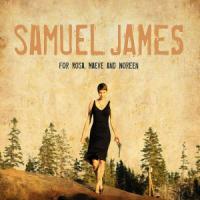Samuel James - For Rosa, Maeve and Noreen
Samuel James is the most exciting acoustic blues musician to emerge in years. Still a young man, he's established an instantly recognizable and unique voice that's expanded with his second record for Canadian label NorthernBlues, "For Rosa, Maeve and Noreen." The album is a continuation of debut "Songs Famed for Sorrow and Joy"--just guitar (or banjo), vocals, and some foot-patting percussion. It features the return of characters Sugar Smallhouse and Big Black Ben is back as Bigger Blacker Ben. Though his acoustic guitar (and banjo) playing is dazzling and James' voice is expressive and soulful, it's as a songwriter that he's most impressive. He's first and foremost a storyteller and his songs are without cliche. That's not easy in the blues.
Opener "Bigger Blacker Ben" has James singing about trickster Ben evading the white lynch mob. "Joe Fletcher's Blues" is a fingerpicked number about man doing everything he can to get away from a woman. "A Sugar Smallhouse Valentine" features Sugar telling his woman anything he can think of as an excuse for showing up without a gift. "I'll Break Your Promise" gives James a chance to display his slide guitar skills. "Darlin' Maeve" is another song about being dedicated to a woman can lead to trouble that starts off slow before picking up the pace. By the end of the song, the narrator seems so into Maeve he doesn't mind heading off to prison. "Miss Noreen" is a banjo-picking dance number. "Trouble on Congess Street Rag" is the album's only instrumental and features some piedmont-style guitar. It's a nice change of pace, but plays away from James' greatest strengths. "John Ross Said" returns to those strengths with an appropriately melancholy song telling the story of 19th century Cherokee leader John Ross. "The Water Always Changing, But the River..." has a driving guitar that brings to mind 60-era Bukka White. "Wooden Tombstone" is an effective a capella number with a tapping foot incresing the intimate feel. "Path of Ashes' is a gospel number with (overdubbed?) piano and harmonica.
It's uncommon enough to get genuinely new styles of traditional acoustic blues that Samuel James is worth celebrating. We've seen other young men like Corey Harris and Alvin Youngblood Hart start off their careers dedicated exclusively to acoustic blues before branching out and exploring broader types of music. Whether James stays along the path he's started or strays to explore, his music is sure to be worth hearing. Let's hope we get more of it.
Opener "Bigger Blacker Ben" has James singing about trickster Ben evading the white lynch mob. "Joe Fletcher's Blues" is a fingerpicked number about man doing everything he can to get away from a woman. "A Sugar Smallhouse Valentine" features Sugar telling his woman anything he can think of as an excuse for showing up without a gift. "I'll Break Your Promise" gives James a chance to display his slide guitar skills. "Darlin' Maeve" is another song about being dedicated to a woman can lead to trouble that starts off slow before picking up the pace. By the end of the song, the narrator seems so into Maeve he doesn't mind heading off to prison. "Miss Noreen" is a banjo-picking dance number. "Trouble on Congess Street Rag" is the album's only instrumental and features some piedmont-style guitar. It's a nice change of pace, but plays away from James' greatest strengths. "John Ross Said" returns to those strengths with an appropriately melancholy song telling the story of 19th century Cherokee leader John Ross. "The Water Always Changing, But the River..." has a driving guitar that brings to mind 60-era Bukka White. "Wooden Tombstone" is an effective a capella number with a tapping foot incresing the intimate feel. "Path of Ashes' is a gospel number with (overdubbed?) piano and harmonica.
It's uncommon enough to get genuinely new styles of traditional acoustic blues that Samuel James is worth celebrating. We've seen other young men like Corey Harris and Alvin Youngblood Hart start off their careers dedicated exclusively to acoustic blues before branching out and exploring broader types of music. Whether James stays along the path he's started or strays to explore, his music is sure to be worth hearing. Let's hope we get more of it.




